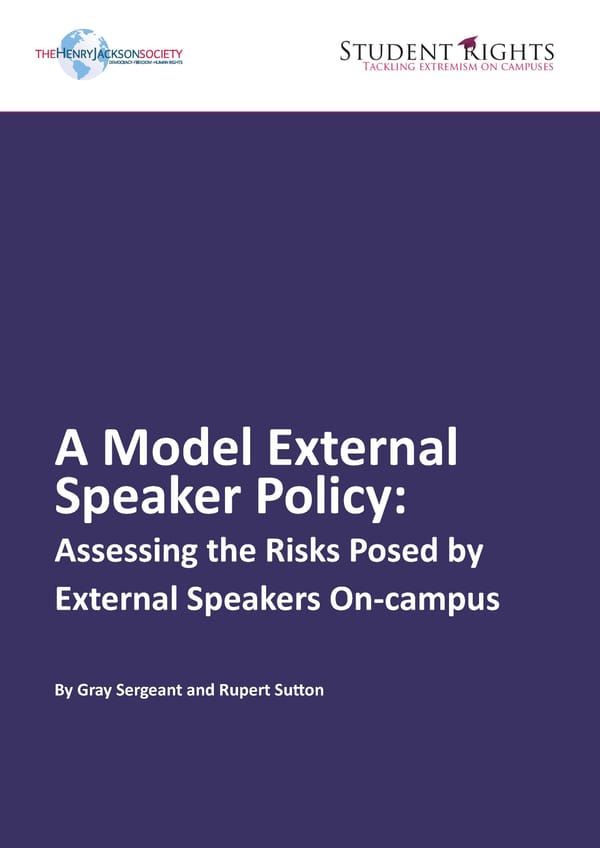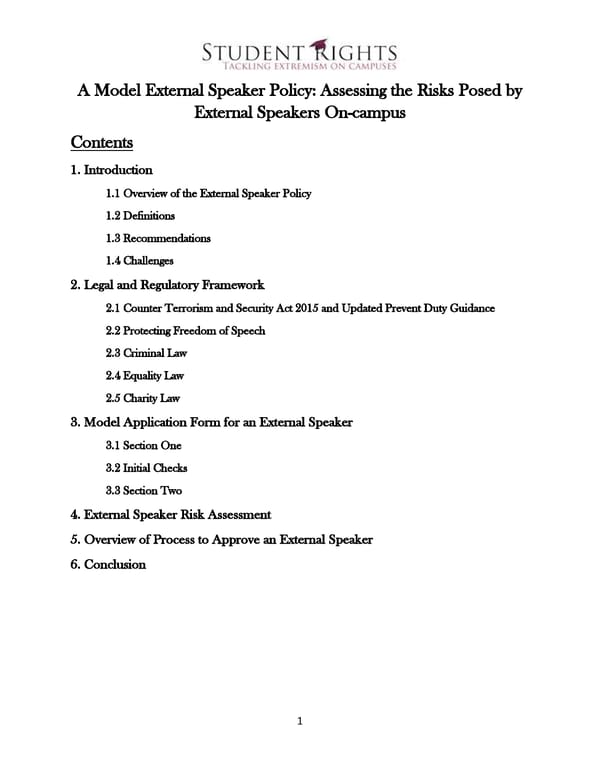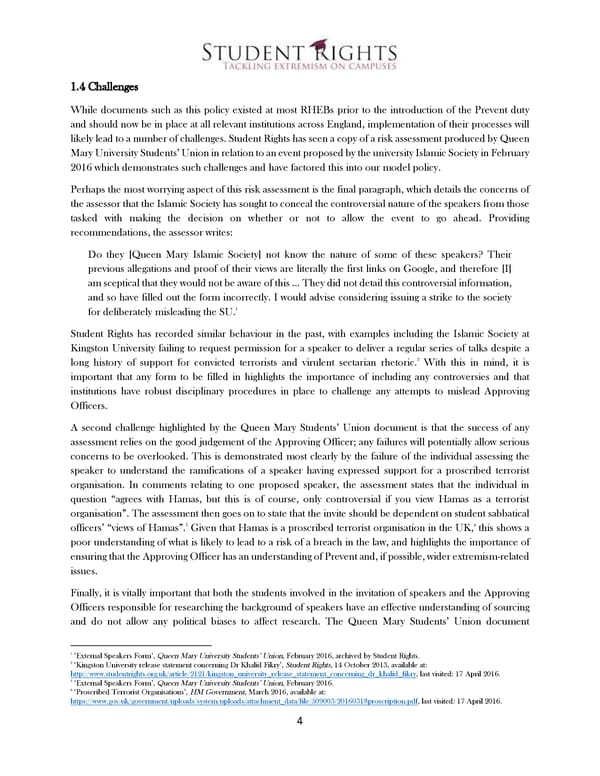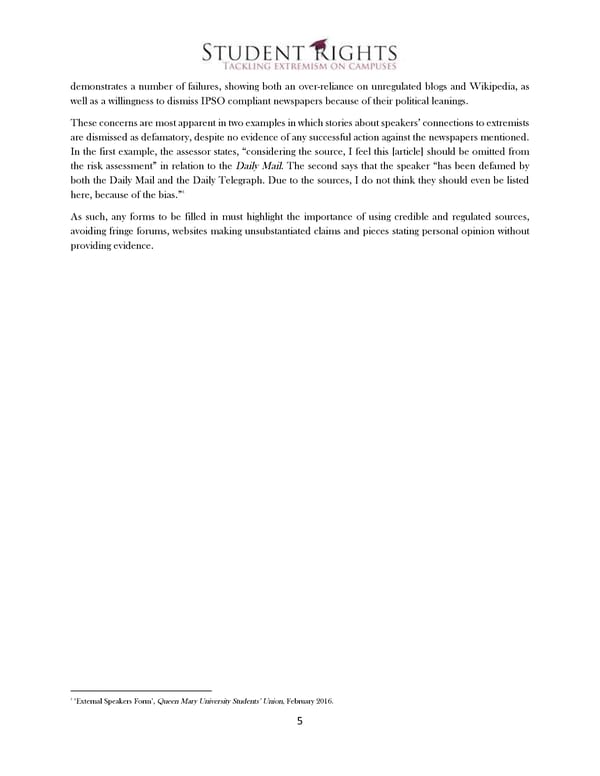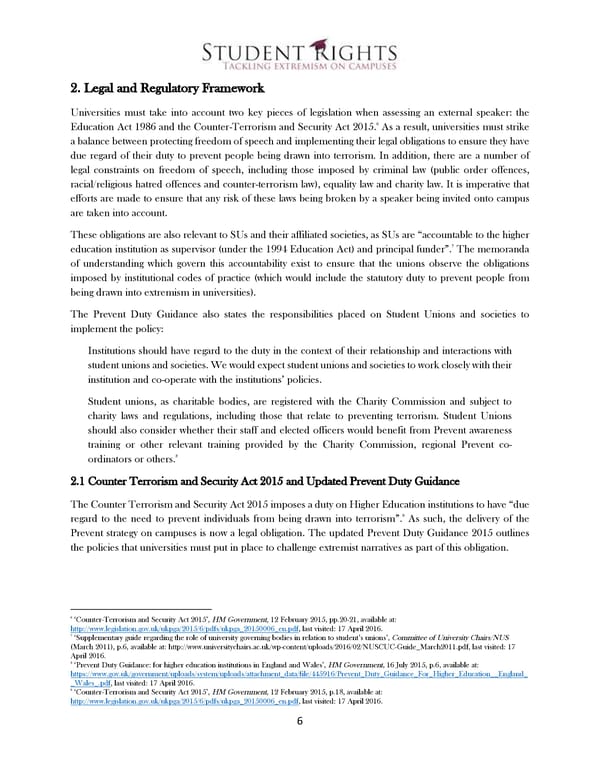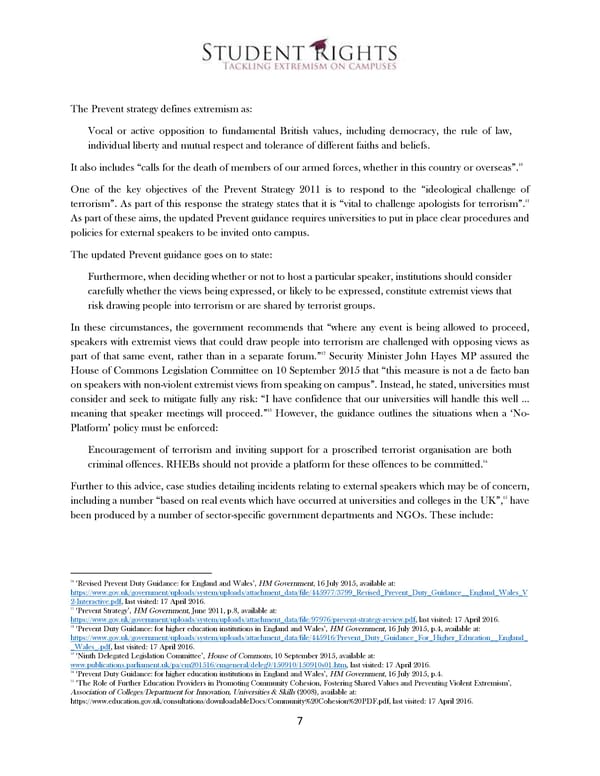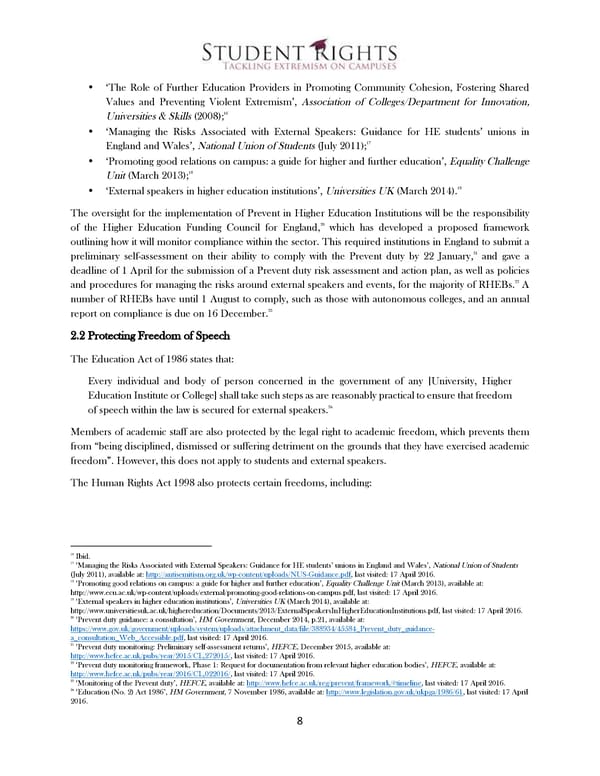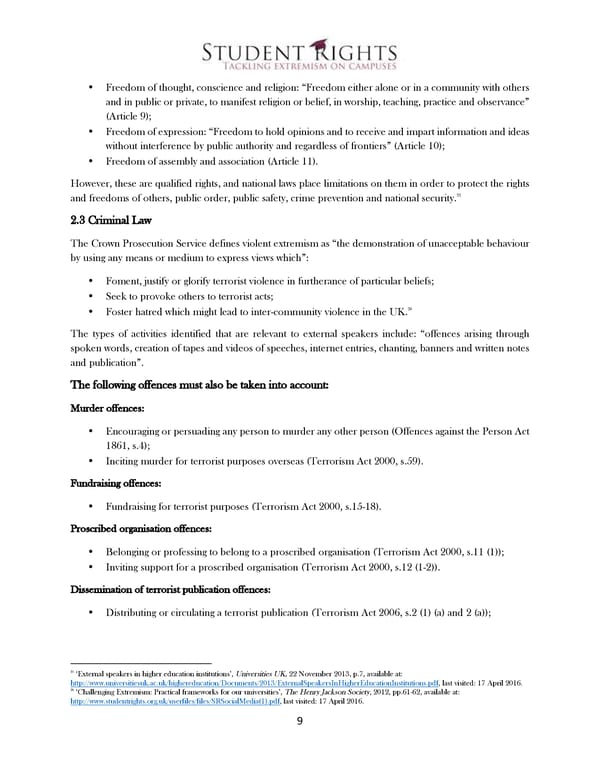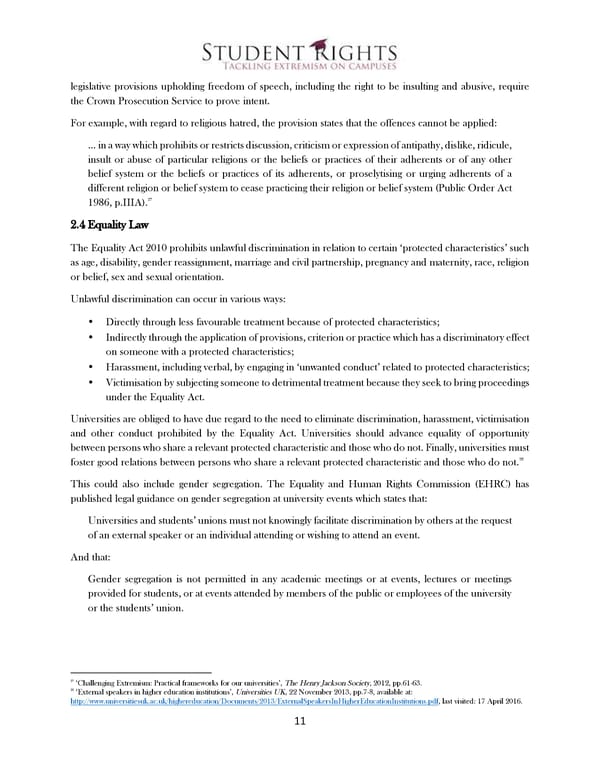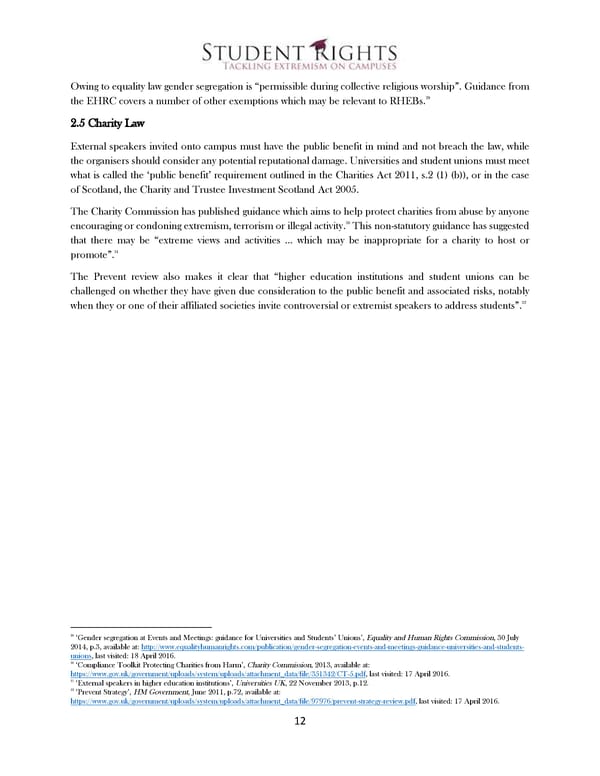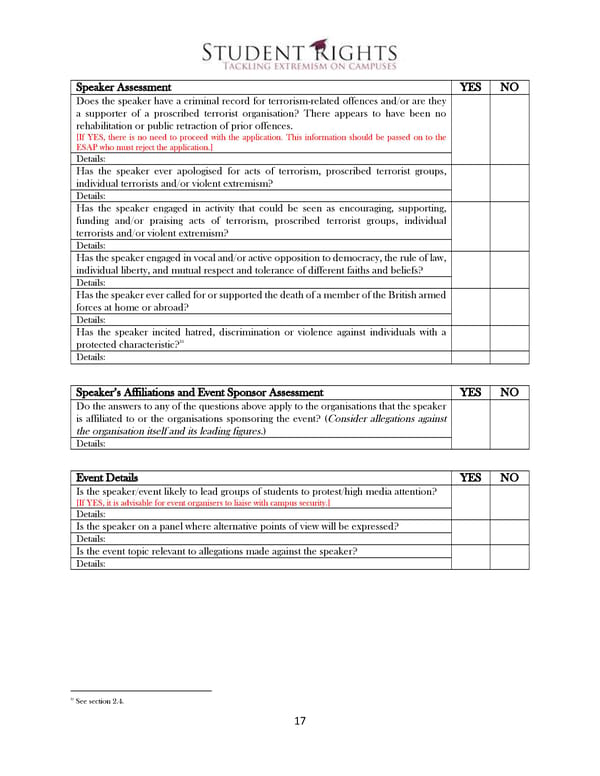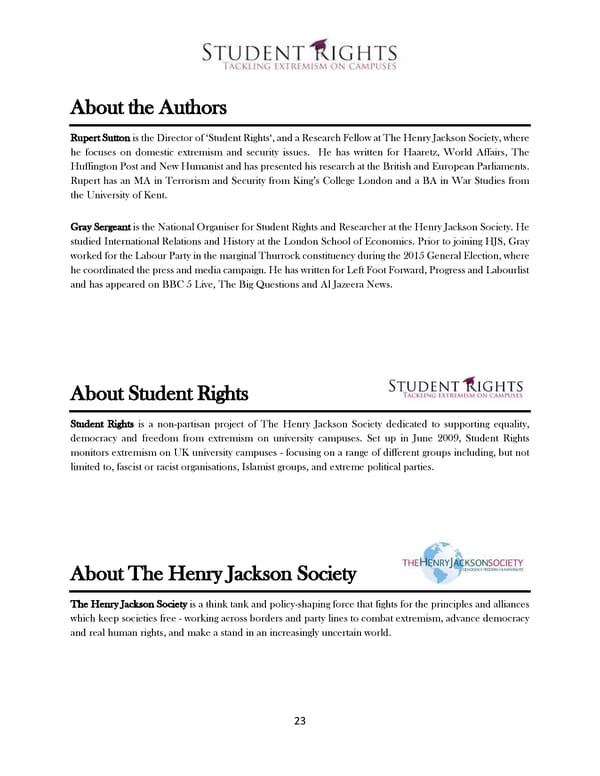A Model External Speaker Policy
A Model External Speaker Policy: Assessing the Risks Posed by External Speakers On-campus By Gray Sergeant and Rupert Sutton
! A Model External Speaker Policy: Assessing the Risks Posed by External Speakers On-campus Contents 1. Introduction 1.1 Overview of the External Speaker Policy 1.2 Definitions 1.3 Recommendations 1.4 Challenges 2. Legal and Regulatory Framework 2.1 Counter Terrorism and Security Act 2015 and Updated Prevent Duty Guidance 2.2 Protecting Freedom of Speech 2.3 Criminal Law 2.4 Equality Law 2.5 Charity Law 3. Model Application Form for an External Speaker 3.1 Section One 3.2 Initial Checks 3.3 Section Two 4. External Speaker Risk Assessment 5. Overview of Process to Approve an External Speaker 6. Conclusion 1! !
! 1. Introduction In light of the provisions of the Counter Terrorism and Security Act 2015, which impose a duty on Higher Education institutions to have “due regard to the need to prevent individuals from being drawn into terrorism”, Student Rights has developed this Model Speaker Policy. The delivery of the Prevent strategy on campuses is now a legal obligation which requires all relevant higher education bodies (RHEB) to have “policies and procedures in place for the management of events on campus and use of all RHEB premises”. The government also emphasises the need to challenge extremist narratives at events rather than simply banning speakers from appearing, in order to enable institutions to fulfil their legal obligations towards academic freedom. This policy aims to provide guidance on identifying extremist speakers and to offer advice concerning practical steps that can be put in place to ensure that extremist narratives are challenged. We are aware that universities will have to consider the costs of implementing this policy. Therefore, we have tried to make the process as undemanding as possible while ensuring the process is a thorough one. We also understand that many universities already have procedures in place and that the policy will most likely be adjusted to fit within current systems. As a result, practical adjustment such as timeframes and allocation of staff may be necessary, and the policy should be seen as an ideal process rather than the minimum standard for sector regulation, taking institutional context and event-specific circumstances into account. However, we do make several recommendations that we feel should be accommodated to ensure that the process of assessing an external speaker is a collaborative effort between students and the university. This must not be a top-down process, conducted by university staff behind closed doors. Students, student union officials and university staff should cooperate when carrying out background checks, and the final decision on the level of risk posed by any external speaker about whom concerns are raised should be made by a committee of both staff and students. The risk assessment questions and action points are the key parts of this policy, which we recommend universities adopt in full. They have been designed with the Prevent Duty guidance in mind and in many cases will provide clear-cut advice. The ultimate intention of the policy is to allow as many events to go ahead as normally as possible. Only in the most serious cases does the policy recommend that a speaker be banned from campus. Those speakers considered to be a risk can be ranked either low, medium or high risk; varying conditions are suggested that aim to ensure debate and keep the audience and speaker safe. 1.1 Overview of the External Speaker Policy The External Speaker Policy will apply to all persons invited to speak or otherwise take part in events to be held on university premises, who are not a current student or member of staff. Students and staff who wish to invite an external speaker onto campus must complete Section One of the External Speaker Application Form as part of an initial review into the speaker. This includes providing the speaker’s background details, as well as a brief examination into any potential concerns that may be raised about the speaker’s attendance. The principal organiser will also be required to carry out a rigorous online search into the speaker and their affiliations, looking specifically at potential concerns surrounding issues of extremism, hate speech and terrorism. 2! !
! An Approving Officer will be responsible for reviewing the information provided in Section One. In the majority of cases, the process will not extend any further than this review and the event will proceed as planned. However, if concerns are raised at this stage, the Approving Officer must complete Section Two of the application. Once Section Two has been completed, it will be the role of the External Speaker Assessment Panel (ESAP) to assess the risk the external speaker poses, by considering the evidence presented. It will then be the job of the ESAP to approve or reject the application for the external speaker. Alternatively, the ESAP can approve the application subject to certain conditions being met. These conditions will be designed to ensure that the event takes place in an open and secure environment where debate can take place, and should be the preferred option. The decision of the ESAP can be appealed, at which point additional evidence may be presented to the ESAP before they reconsider their decision. A decision should be made within three working days of the appeal being made. 1.2 Definitions External speaker: anyone other than a current student or current staff member of the university or student union (SU) who may be invited to participate in a debate or deliver a speech/presentation and similar activities, including anything conducted in the name of the university other than timetabled academic activities. Event : any meeting, gathering, conference or related activity involving a group of people. This does not apply to normal teaching or training sessions or other academic or administrative operational meetings unless both outside speakers and an audience are involved. 1.3 Recommendations •! Any speaker policy that is adopted should be distributed as widely as possible. It should be easily accessible online and available from the SU; •! The purpose of this policy should be communicated to student societies and staff at the beginning of the academic term; •! Approving Officers will need to be put in place, whose role will be to review and assess external speaker applications. The Approving Officers should be members of staff at the university with an understanding of Prevent and the relevant training, as well as an understanding of the events process, with oversight from the university Prevent Coordinator; •! A designated External Speaker Assessment Panel (ESAP) should be convened with the power to make the final decision on whether an event should go ahead and what, if any, conditions need to be put in place; •! The ESAP should be balanced between relevant members of the student union and senior members of the university, and would ideally be made up of no more than five individuals. Potential members could include the following (or their equivalents): SU President, SU Events and Activities Officer, the university Equality and Diversity Officer, the university Prevent Coordinator, a member of university Facilities or Estates staff involved in room bookings or security for events, or any staff member with experience of relevant Prevent training; •! The decision of the ESAP does not need to be made at a formal meeting if it is not practical to do so, in which case it may be agreed through email contact. 3! !
! 1.4 Challenges While documents such as this policy existed at most RHEBs prior to the introduction of the Prevent duty and should now be in place at all relevant institutions across England, implementation of their processes will likely lead to a number of challenges. Student Rights has seen a copy of a risk assessment produced by Queen Mary University Students’ Union in relation to an event proposed by the university Islamic Society in February 2016 which demonstrates such challenges and have factored this into our model policy. Perhaps the most worrying aspect of this risk assessment is the final paragraph, which details the concerns of the assessor that the Islamic Society has sought to conceal the controversial nature of the speakers from those tasked with making the decision on whether or not to allow the event to go ahead. Providing recommendations, the assessor writes: Do they [Queen Mary Islamic Society] not know the nature of some of these speakers? Their previous allegations and proof of their views are literally the first links on Google, and therefore [I] am sceptical that they would not be aware of this … They did not detail this controversial information, and so have filled out the form incorrectly. I would advise considering issuing a strike to the society 1 for deliberately misleading the SU. Student Rights has recorded similar behaviour in the past, with examples including the Islamic Society at Kingston University failing to request permission for a speaker to deliver a regular series of talks despite a 2 long history of support for convicted terrorists and virulent sectarian rhetoric. With this in mind, it is important that any form to be filled in highlights the importance of including any controversies and that institutions have robust disciplinary procedures in place to challenge any attempts to mislead Approving Officers. A second challenge highlighted by the Queen Mary Students’ Union document is that the success of any assessment relies on the good judgement of the Approving Officer; any failures will potentially allow serious concerns to be overlooked. This is demonstrated most clearly by the failure of the individual assessing the speaker to understand the ramifications of a speaker having expressed support for a proscribed terrorist organisation. In comments relating to one proposed speaker, the assessment states that the individual in question “agrees with Hamas, but this is of course, only controversial if you view Hamas as a terrorist organisation”. The assessment then goes on to state that the invite should be dependent on student sabbatical 3 4 officers’ “views of Hamas”. Given that Hamas is a proscribed terrorist organisation in the UK, this shows a poor understanding of what is likely to lead to a risk of a breach in the law, and highlights the importance of ensuring that the Approving Officer has an understanding of Prevent and, if possible, wider extremism-related issues. Finally, it is vitally important that both the students involved in the invitation of speakers and the Approving Officers responsible for researching the background of speakers have an effective understanding of sourcing and do not allow any political biases to affect research. The Queen Mary Students’ Union document !!!!!!!!!!!!!!!!!!!!!!!!!!!!!!!!!!!!!!!!!!!!!!!!!!!!!!!!!!!!! 1 ‘External Speakers Form’, Queen Mary University Students’ Union, February 2016, archived by Student Rights. 2 ‘Kingston University release statement concerning Dr Khalid Fikry’, Student Rights, 14 October 2013, available at: http://www.studentrights.org.uk/article/2121/kingston_university_release_statement_concerning_dr_khalid_fikry, last visited: 17 April 2016. 3 ‘External Speakers Form’, Queen Mary University Students’ Union, February 2016. 4 ‘Proscribed Terrorist Organisations’, HM Government, March 2016, available at: https://www.gov.uk/government/uploads/system/uploads/attachment_data/file/509003/20160318proscription.pdf, last visited: 17 April 2016. 4! !
! demonstrates a number of failures, showing both an over-reliance on unregulated blogs and Wikipedia, as well as a willingness to dismiss IPSO compliant newspapers because of their political leanings. These concerns are most apparent in two examples in which stories about speakers’ connections to extremists are dismissed as defamatory, despite no evidence of any successful action against the newspapers mentioned. In the first example, the assessor states, “considering the source, I feel this [article] should be omitted from the risk assessment” in relation to the Daily Mail. The second says that the speaker “has been defamed by both the Daily Mail and the Daily Telegraph. Due to the sources, I do not think they should even be listed here, because of the bias.”5 As such, any forms to be filled in must highlight the importance of using credible and regulated sources, avoiding fringe forums, websites making unsubstantiated claims and pieces stating personal opinion without providing evidence. !!!!!!!!!!!!!!!!!!!!!!!!!!!!!!!!!!!!!!!!!!!!!!!!!!!!!!!!!!!!! 5 ‘External Speakers Form’, Queen Mary University Students’ Union, February 2016. 5! !
! 2. Legal and Regulatory Framework Universities must take into account two key pieces of legislation when assessing an external speaker: the 6 Education Act 1986 and the Counter-Terrorism and Security Act 2015. As a result, universities must strike a balance between protecting freedom of speech and implementing their legal obligations to ensure they have due regard of their duty to prevent people being drawn into terrorism. In addition, there are a number of legal constraints on freedom of speech, including those imposed by criminal law (public order offences, racial/religious hatred offences and counter-terrorism law), equality law and charity law. It is imperative that efforts are made to ensure that any risk of these laws being broken by a speaker being invited onto campus are taken into account. These obligations are also relevant to SUs and their affiliated societies, as SUs are “accountable to the higher education institution as supervisor (under the 1994 Education Act) and principal funder”.7 The memoranda of understanding which govern this accountability exist to ensure that the unions observe the obligations imposed by institutional codes of practice (which would include the statutory duty to prevent people from being drawn into extremism in universities). The Prevent Duty Guidance also states the responsibilities placed on Student Unions and societies to implement the policy: Institutions should have regard to the duty in the context of their relationship and interactions with student unions and societies. We would expect student unions and societies to work closely with their institution and co-operate with the institutions’ policies. Student unions, as charitable bodies, are registered with the Charity Commission and subject to charity laws and regulations, including those that relate to preventing terrorism. Student Unions should also consider whether their staff and elected officers would benefit from Prevent awareness training or other relevant training provided by the Charity Commission, regional Prevent co- 8 ordinators or others. 2.1 Counter Terrorism and Security Act 2015 and Updated Prevent Duty Guidance The Counter Terrorism and Security Act 2015 imposes a duty on Higher Education institutions to have “due 9 regard to the need to prevent individuals from being drawn into terrorism”. As such, the delivery of the Prevent strategy on campuses is now a legal obligation. The updated Prevent Duty Guidance 2015 outlines the policies that universities must put in place to challenge extremist narratives as part of this obligation. !!!!!!!!!!!!!!!!!!!!!!!!!!!!!!!!!!!!!!!!!!!!!!!!!!!!!!!!!!!!! 6 ‘Counter-Terrorism and Security Act 2015’, HM Government, 12 February 2015, pp.20-21, available at: http://www.legislation.gov.uk/ukpga/2015/6/pdfs/ukpga_20150006_en.pdf, last visited: 17 April 2016. 7 ‘Supplementary guide regarding the role of university governing bodies in relation to student’s unions’, Committee of University Chairs/NUS (March 2011), p.6, available at:!http://www.universitychairs.ac.uk/wp-content/uploads/2016/02/NUSCUC-Guide_March2011.pdf, last visited: 17 April 2016. 8 ‘Prevent Duty Guidance: for higher education institutions in England and Wales’, HM Government, 16 July 2015, p.6, available at: https://www.gov.uk/government/uploads/system/uploads/attachment_data/file/445916/Prevent_Duty_Guidance_For_Higher_Education__England_ _Wales_.pdf, last visited: 17 April 2016. 9 ‘Counter-Terrorism and Security Act 2015’, HM Government, 12 February 2015, p.18, available at: http://www.legislation.gov.uk/ukpga/2015/6/pdfs/ukpga_20150006_en.pdf, last visited: 17 April 2016. 6! !
! The Prevent strategy defines extremism as: Vocal or active opposition to fundamental British values, including democracy, the rule of law, individual liberty and mutual respect and tolerance of different faiths and beliefs. 10 It also includes “calls for the death of members of our armed forces, whether in this country or overseas”. One of the key objectives of the Prevent Strategy 2011 is to respond to the “ideological challenge of terrorism”. As part of this response the strategy states that it is “vital to challenge apologists for terrorism”.11 As part of these aims, the updated Prevent guidance requires universities to put in place clear procedures and policies for external speakers to be invited onto campus. The updated Prevent guidance goes on to state: Furthermore, when deciding whether or not to host a particular speaker, institutions should consider carefully whether the views being expressed, or likely to be expressed, constitute extremist views that risk drawing people into terrorism or are shared by terrorist groups. In these circumstances, the government recommends that “where any event is being allowed to proceed, speakers with extremist views that could draw people into terrorism are challenged with opposing views as 12 part of that same event, rather than in a separate forum.” Security Minister John Hayes MP assured the House of Commons Legislation Committee on 10 September 2015 that “this measure is not a de facto ban on speakers with non-violent extremist views from speaking on campus”. Instead, he stated, universities must consider and seek to mitigate fully any risk: “I have confidence that our universities will handle this well … meaning that speaker meetings will proceed.”13 However, the guidance outlines the situations when a ‘No- Platform’ policy must be enforced: Encouragement of terrorism and inviting support for a proscribed terrorist organisation are both 14 criminal offences. RHEBs should not provide a platform for these offences to be committed. Further to this advice, case studies detailing incidents relating to external speakers which may be of concern, 15 including a number “based on real events which have occurred at universities and colleges in the UK”, have been produced by a number of sector-specific government departments and NGOs. These include: !!!!!!!!!!!!!!!!!!!!!!!!!!!!!!!!!!!!!!!!!!!!!!!!!!!!!!!!!!!!! 10 ‘Revised Prevent Duty Guidance: for England and Wales’, HM Government, 16 July 2015, available at: https://www.gov.uk/government/uploads/system/uploads/attachment_data/file/445977/3799_Revised_Prevent_Duty_Guidance__England_Wales_V 2-Interactive.pdf, last visited: 17 April 2016. 11 ‘Prevent Strategy’, HM Government, June 2011, p.8, available at: https://www.gov.uk/government/uploads/system/uploads/attachment_data/file/97976/prevent-strategy-review.pdf, last visited: 17 April 2016. 12 ‘Prevent Duty Guidance: for higher education institutions in England and Wales’, HM Government, 16 July 2015, p.4, available at: https://www.gov.uk/government/uploads/system/uploads/attachment_data/file/445916/Prevent_Duty_Guidance_For_Higher_Education__England_ _Wales_.pdf, last visited: 17 April 2016. 13 ‘Ninth Delegated Legislation Committee’, House of Commons, 10 September 2015, available at: www.publications.parliament.uk/pa/cm201516/cmgeneral/deleg9/150910/150910s01.htm, last visited: 17 April 2016. 14 ‘Prevent Duty Guidance: for higher education institutions in England and Wales’, HM Government, 16 July 2015, p.4. 15 ‘The Role of Further Education Providers in Promoting Community Cohesion, Fostering Shared Values and Preventing Violent Extremism’, Association of Colleges/Department for Innovation, Universities & Skills (2008), available at: https://www.education.gov.uk/consultations/downloadableDocs/Community%20Cohesion%20PDF.pdf, last visited: 17 April 2016. 7! !
! •! ‘The Role of Further Education Providers in Promoting Community Cohesion, Fostering Shared Values and Preventing Violent Extremism’, Association of Colleges/Department for Innovation, 16 Universities & Skills (2008); •! ‘Managing the Risks Associated with External Speakers: Guidance for HE students’ unions in 17 England and Wales’, National Union of Students (July 2011); •! ‘Promoting good relations on campus: a guide for higher and further education’, Equality Challenge 18 Unit (March 2013); 19 •! ‘External speakers in higher education institutions’, Universities UK (March 2014). The oversight for the implementation of Prevent in Higher Education Institutions will be the responsibility 20 of the Higher Education Funding Council for England, which has developed a proposed framework outlining how it will monitor compliance within the sector. This required institutions in England to submit a 21 preliminary self-assessment on their ability to comply with the Prevent duty by 22 January, and gave a deadline of 1 April for the submission of a Prevent duty risk assessment and action plan, as well as policies 22 and procedures for managing the risks around external speakers and events, for the majority of RHEBs. A number of RHEBs have until 1 August to comply, such as those with autonomous colleges, and an annual 23 report on compliance is due on 16 December. ! 2.2 Protecting Freedom of Speech The Education Act of 1986 states that: Every individual and body of person concerned in the government of any [University, Higher Education Institute or College] shall take such steps as are reasonably practical to ensure that freedom 24 of speech within the law is secured for external speakers. Members of academic staff are also protected by the legal right to academic freedom, which prevents them from “being disciplined, dismissed or suffering detriment on the grounds that they have exercised academic freedom”. However, this does not apply to students and external speakers. The Human Rights Act 1998 also protects certain freedoms, including: !!!!!!!!!!!!!!!!!!!!!!!!!!!!!!!!!!!!!!!!!!!!!!!!!!!!!!!!!!!!! 16 Ibid. 17 ‘Managing the Risks Associated with External Speakers: Guidance for HE students’ unions in England and Wales’, National Union of Students (July 2011), available at: http://antisemitism.org.uk/wp-content/uploads/NUS-Guidance.pdf, last visited: 17 April 2016. 18 ‘Promoting good relations on campus: a guide for higher and further education’, Equality Challenge Unit (March 2013), available at: http://www.ecu.ac.uk/wp-content/uploads/external/promoting-good-relations-on-campus.pdf, last visited: 17 April 2016. 19 ‘External speakers in higher education institutions’, Universities UK (March 2014), available at: http://www.universitiesuk.ac.uk/highereducation/Documents/2013/ExternalSpeakersInHigherEducationInstitutions.pdf, last visited: 17 April 2016. 20 ‘Prevent duty guidance: a consultation’, HM Government, December 2014, p.21, available at: https://www.gov.uk/government/uploads/system/uploads/attachment_data/file/388934/45584_Prevent_duty_guidance- a_consultation_Web_Accessible.pdf, last visited: 17 April 2016. 21 ‘Prevent duty monitoring: Preliminary self-assessment returns’, HEFCE, December 2015, available at: http://www.hefce.ac.uk/pubs/year/2015/CL,272015/, last visited: 17 April 2016. 22 ‘Prevent duty monitoring framework, Phase 1: Request for documentation from relevant higher education bodies’, HEFCE, available at: http://www.hefce.ac.uk/pubs/year/2016/CL,022016/, last visited: 17 April 2016. 23 ‘Monitoring of the Prevent duty’, HEFCE, available at: http://www.hefce.ac.uk/reg/prevent/framework/#timeline, last visited: 17 April 2016. 24 ‘Education (No. 2) Act 1986’, HM Government, 7 November 1986, available at: http://www.legislation.gov.uk/ukpga/1986/61, last visited: 17 April 2016. 8! !
! •! Freedom of thought, conscience and religion: “Freedom either alone or in a community with others and in public or private, to manifest religion or belief, in worship, teaching, practice and observance” (Article 9); •! Freedom of expression: “Freedom to hold opinions and to receive and impart information and ideas without interference by public authority and regardless of frontiers” (Article 10); •! Freedom of assembly and association (Article 11). However, these are qualified rights, and national laws place limitations on them in order to protect the rights 25 and freedoms of others, public order, public safety, crime prevention and national security. 2.3 Criminal Law The Crown Prosecution Service defines violent extremism as “the demonstration of unacceptable behaviour by using any means or medium to express views which”: •! Foment, justify or glorify terrorist violence in furtherance of particular beliefs; •! Seek to provoke others to terrorist acts; 26 •! Foster hatred which might lead to inter-community violence in the UK. The types of activities identified that are relevant to external speakers include: “offences arising through spoken words, creation of tapes and videos of speeches, internet entries, chanting, banners and written notes and publication”. The following offences must also be taken into account: Murder offences: •! Encouraging or persuading any person to murder any other person (Offences against the Person Act 1861, s.4); •! Inciting murder for terrorist purposes overseas (Terrorism Act 2000, s.59). Fundraising offences: •! Fundraising for terrorist purposes (Terrorism Act 2000, s.15-18). Proscribed organisation offences: •! Belonging or professing to belong to a proscribed organisation (Terrorism Act 2000, s.11 (1)); •! Inviting support for a proscribed organisation (Terrorism Act 2000, s.12 (1-2)). Dissemination of terrorist publication offences: •! Distributing or circulating a terrorist publication (Terrorism Act 2006, s.2 (1) (a) and 2 (a)); !!!!!!!!!!!!!!!!!!!!!!!!!!!!!!!!!!!!!!!!!!!!!!!!!!!!!!!!!!!!! 25 ‘External speakers in higher education institutions’, Universities UK, 22 November 2013, p.7, available at: http://www.universitiesuk.ac.uk/highereducation/Documents/2013/ExternalSpeakersInHigherEducationInstitutions.pdf, last visited: 17 April 2016. 26 ‘Challenging Extremism: Practical frameworks for our universities’, The Henry Jackson Society, 2012, pp.61-62, available at: http://www.studentrights.org.uk/userfiles/files/SRSocialMedia(1).pdf, last visited: 17 April 2016. 9! !
! •! Possessing a terrorist publication with view to distribute/sell/loan/read/listen/see (Terrorism Act 2000, s.2 (1) (a) and (1) (f)). Encouragement of terrorism: •! Encouragement of terrorism (Terrorism Act 2006, s.1). Collection of information offences: •! Collecting or making a record of information of a kind likely to be useful to a person committing or preparing an act of terrorism (Terrorism Act 2000, s.58 (1a)); •! Possessing a document or record containing information of a kind likely to be useful to a person committing or preparing an act of terrorism (Terrorism Act 2000, s.58 (1b)). Racial hatred offences: •! Using threatening/abusive/insulting words or behaviour or displaying written material with intent/likely to stir up racial hatred (Public Order Act 1986, s.18 p.III); •! Publishing/distributing written material which is threatening/abusive/insulting with intent/likely to stir up racial hatred (Public Order Act 1986, s.19 p.III); •! Distributing/showing/playing a recording of visual images or sounds that are threatening/abusive/insulting with intent/likely to stir up racial hatred (Public Order Act 1986, s.21 p.III); •! Possessing a recording of visual images or sounds which are threatening, abusive or insulting for display/publication/distribution with intent/likely to stir up racial hatred (Public Order Act 1986, s.23 p.III). Religious hatred offences: •! Using threatening/abusive/insulting words or behaviour or displaying written material with intent/likely to stir up religious hatred (Public Order Act 1986, s.29B p.IIIA); •! Publishing/distributing written material which is threatening/abusive/insulting with intent/likely to stir up religious hatred (Public Order Act 1986, s.29C p.IIIA); •! Distributing/showing/playing a recording of visual images or sounds that are threatening/abusive/insulting with intent/likely to stir up religious hatred (Public Order Act 1986, s.29E p.IIIA); •! Possessing a recording of visual images or sounds which are threatening, abusive or insulting for display/publication/distribution with intent/likely to stir up religious hatred (Public Order Act 1986, s.29F p.IIIA). Harassment: •! Using threatening, abusive or insulting words or behaviour likely to cause harassment, alarm or distress (Public Order Act, s.5). There is an important distinction between inciting racial hatred and/or harassment offences and inciting religious hatred or incitement to hatred because of sexual orientation. In religious and sexual orientation cases 10! !
! legislative provisions upholding freedom of speech, including the right to be insulting and abusive, require the Crown Prosecution Service to prove intent. For example, with regard to religious hatred, the provision states that the offences cannot be applied: … in a way which prohibits or restricts discussion, criticism or expression of antipathy, dislike, ridicule, insult or abuse of particular religions or the beliefs or practices of their adherents or of any other belief system or the beliefs or practices of its adherents, or proselytising or urging adherents of a different religion or belief system to cease practicing their religion or belief system (Public Order Act 27 1986, p.IIIA). 2.4 Equality Law The Equality Act 2010 prohibits unlawful discrimination in relation to certain ‘protected characteristics’ such as age, disability, gender reassignment, marriage and civil partnership, pregnancy and maternity, race, religion or belief, sex and sexual orientation. Unlawful discrimination can occur in various ways: •! Directly through less favourable treatment because of protected characteristics; •! Indirectly through the application of provisions, criterion or practice which has a discriminatory effect on someone with a protected characteristics; •! Harassment, including verbal, by engaging in ‘unwanted conduct’ related to protected characteristics; •! Victimisation by subjecting someone to detrimental treatment because they seek to bring proceedings under the Equality Act. Universities are obliged to have due regard to the need to eliminate discrimination, harassment, victimisation and other conduct prohibited by the Equality Act. Universities should advance equality of opportunity between persons who share a relevant protected characteristic and those who do not. Finally, universities must 28 foster good relations between persons who share a relevant protected characteristic and those who do not. This could also include gender segregation. The Equality and Human Rights Commission (EHRC) has published legal guidance on gender segregation at university events which states that: Universities and students’ unions must not knowingly facilitate discrimination by others at the request of an external speaker or an individual attending or wishing to attend an event. And that: Gender segregation is not permitted in any academic meetings or at events, lectures or meetings provided for students, or at events attended by members of the public or employees of the university or the students’ union. !!!!!!!!!!!!!!!!!!!!!!!!!!!!!!!!!!!!!!!!!!!!!!!!!!!!!!!!!!!!! 27 ‘Challenging Extremism: Practical frameworks for our universities’, The Henry Jackson Society, 2012, pp.61-63. 28 ‘External speakers in higher education institutions’, Universities UK, 22 November 2013, pp.7-8, available at: http://www.universitiesuk.ac.uk/highereducation/Documents/2013/ExternalSpeakersInHigherEducationInstitutions.pdf, last visited: 17 April 2016. 11! !
! Owing to equality law gender segregation is “permissible during collective religious worship”. Guidance from 29 the EHRC covers a number of other exemptions which may be relevant to RHEBs. 2.5 Charity Law External speakers invited onto campus must have the public benefit in mind and not breach the law, while the organisers should consider any potential reputational damage. Universities and student unions must meet what is called the ‘public benefit’ requirement outlined in the Charities Act 2011, s.2 (1) (b)), or in the case of Scotland, the Charity and Trustee Investment Scotland Act 2005. The Charity Commission has published guidance which aims to help protect charities from abuse by anyone 30 encouraging or condoning extremism, terrorism or illegal activity. This non-statutory guidance has suggested that there may be “extreme views and activities … which may be inappropriate for a charity to host or 31 promote”. The Prevent review also makes it clear that “higher education institutions and student unions can be challenged on whether they have given due consideration to the public benefit and associated risks, notably when they or one of their affiliated societies invite controversial or extremist speakers to address students”.32 !!!!!!!!!!!!!!!!!!!!!!!!!!!!!!!!!!!!!!!!!!!!!!!!!!!!!!!!!!!!! 29 ‘Gender segregation at Events and Meetings: guidance for Universities and Students’ Unions’, Equality and Human Rights Commission, 30 July 2014, p.3, available at: http://www.equalityhumanrights.com/publication/gender-segregation-events-and-meetings-guidance-universities-and-students- unions, last visited: 18 April 2016. 30 ‘Compliance Toolkit Protecting Charities from Harm’, Charity Commission, 2013, available at: https://www.gov.uk/government/uploads/system/uploads/attachment_data/file/351342/CT-5.pdf, last visited: 17 April 2016. 31 ‘External speakers in higher education institutions’, Universities UK, 22 November 2013, p.12. 32 ‘Prevent Strategy’, HM Government, June 2011, p.72, available at: https://www.gov.uk/government/uploads/system/uploads/attachment_data/file/97976/prevent-strategy-review.pdf, last visited: 17 April 2016. 12! !
! 3. Model Application Form for an External Speaker 3.1 Section One [To be filled out by the student society/member of staff requesting permission for external speaker to appear on campus.] This must be filled out by a senior member of the society that wishes to invite an external speaker onto 15 working days campus. This form must be submitted a minimum of before the event is intended to take place. Organiser’s Details Name (including all names known by): Society/Club/ Department: Email: Phone: Event Details Event title: Event subject matter/themes: Proposed date: Proposed location: Name of event sponsor(s), if any: Will the audience be segregated by gender? [See Section 2.4 for requirements for this to be permitted] YES □ NO □ If YES, please state reason: Is this event being held as a debate where multiple and opposing ideas will be heard from the speakers on a panel? YES □ NO □ If YES, please list the speakers that will appear alongside this speaker: 13! !
! Speaker’s Details Name (including all names known by): Association: Other affiliations: Social media/websites: Additional Questions: The following questions are designed to inform the university events organiser about additional services that may be required, e.g. security or media management. The answers to follow do not determine whether a speaker undergoes a risk assessment. Is the speaker likely to lead to protest? YES □ NO □ If YES, please give reasons why: Is the speaker likely to attract high media attention? YES □ NO □ If YES, please state why: Risk Assessment: Using a reputable internet search engine, enter the speaker’s name and the following search terms: “[SPEAKER’S NAME/S]” AND “extremism” OR “terrorism” OR “hatred” The first three pages of results must be examined, and this process must be repeated, replacing the speaker’s name with the name of the organisations they are affiliated to, and any organisations sponsoring the event. Please copy the web addresses of any search results that report the following behaviour: •! Inciting hatred, discrimination or violence against individuals with a protected characteristic; •! Apologising for, encouraging, supporting, funding and/or praising a proscribed terrorist organisation; •! Vocal or active opposition to democracy, the rule of law, individual liberty, and mutual respect and tolerance of different faiths and beliefs; •! Any reports of a similar nature that might be of concern. The Approving Officer will take into account the credibility of the source and the evidence provided when reviewing any sources you provide. However, it is best to avoid fringe forums, websites making unsubstantiated claims and pieces stating personal opinion without providing evidence. Please attach below the website addresses or links to any reports that could be of concern. Please state which search engine you have used: 14! !
! 1) 2) 3) Falsifying or concealing the nature of the event or information about the external speaker as requested above may result in the event being postponed or cancelled. What happens next? Thank you for taking the time to submit your application for an external speaker. The Approving Officer will have two working days to review your application and report back to you. In the majority of cases there will be no concerns raised, in which case the event will go ahead as planned, and the speaker will only be required to sign up to the institution’s Equality and Diversity Statement.33 If the Approving Officer has concerns, they will conduct a further investigation into the speaker and within three working days pass their assessment on to a panel of university staff and students for consideration. The panel will make their judgement within four working days. The speaker may be approved, in which case the event will proceed as planned. The speaker may be approved with certain conditions put in place, or the application may be rejected. Both of these decisions can be appealed by writing to the chair of the External Speaker Assessment Panel, who will review the evidence and reply within two working days. It is highly unlikely that the speaker application will be rejected, as the criteria for this is very narrow (see Section Four). However, if the speaker is considered ‘High Risk’, additional speakers will need to be invited to balance the platform. In this situation it may be necessary to delay the event by five working days to achieve this. (See Section Five for an overview of the process to apply for an external speaker) 3.2 Initial Checks [For the Approving Officer.] This review must be completed within two working days, at which point the principal organiser should be made aware of the conclusion of these initial checks. Section One of the application should be reviewed by checking any links provided by the principal organiser. An internet search, using the same search engine as the principal organiser, should be repeated by the Approving Officer: “[SPEAKER’S NAME]” AND “extremism” OR “terrorism” OR “hatred” !!!!!!!!!!!!!!!!!!!!!!!!!!!!!!!!!!!!!!!!!!!!!!!!!!!!!!!!!!!!! 33 Institutions should provide students with directions detailing where to find the Equality and Diversity Statement as part of the speaker form. However, as is already the case for a number of institutions such as the University of Westminster, contact with the speaker requesting the statement be signed should be made by the Approving Officer. 15! !
! This process must be repeated, replacing the speaker’s name with the name of the organisations they are affiliated to, and any organisations sponsoring the event. It is important to check that no websites have been missed or deliberately concealed. If this has occurred the application may be delayed or rejected. Does the evidence found so far link the speaker, their affiliations or the event sponsor to any of the following behaviours? •! Inciting hatred, discrimination or violence against individuals with a protected characteristic; •! Apologising for, encouraging, supporting, funding and/or praising a proscribed terrorist organisation; •! Vocal or active opposition to democracy, the rule of law, individual liberty, and mutual respect and tolerance of different faiths and beliefs. If NO, approve the application and allow the event to proceed as planned. If there are concerns about the speaker, their affiliations or the event sponsor, the Approving Officer must complete Section Two of the application form and pass the case on to the External Speaker Assessment Panel. 3.3 Section Two [To be filled out by the Approving Officer and passed on to the External Speaker Assessment Panel within three working days.] Based on the investigations into the speaker, their affiliations and the event’s sponsor, please complete the form below. It may be necessary to conduct further investigations into the speaker to ensure that the questions can be properly answered. The credibility of the information must be considered: fringe forums, websites making unsubstantiated claims and pieces stating personal opinion without providing evidence should be considered with caution. When assessing allegations made against the speaker, the Approving Officer should also take into account statements where the speaker has apologised or retracted previous actions/comments. It may also be worth investigating whether the speaker has been invited onto university campuses before, whether they were banned or if there were any incidents. In addition, the Approving Officer should contact the university’s police liaison officer, if such a role exists, as some speakers may be more controversial owing to local events or tensions that university staff may be unaware of. Local police forces are required to be aware of any such community issues, and should the university not 34 have a dedicated officer they should identify the relevant figure from the local authority with whom to liaise. A similar role could also be carried out in relation to the local Prevent officer, who may also be able to assist with local guidance or offer options to add balance to a debate, as well as provide advice on managing and mitigating risk. After completion, the application should be passed on to the External Speaker Assessment Panel who will carry out a risk assessment based on the information provided. This application should be kept on internal records for future reference. !!!!!!!!!!!!!!!!!!!!!!!!!!!!!!!!!!!!!!!!!!!!!!!!!!!!!!!!!!!!! 34 See ‘The Application of Neighbourhood Policing to Higher Education Institutions’, ACPO (May 2008), and ‘The Role of Further Education Providers in Promoting Community Cohesion, Fostering Shared Values and Preventing Violent Extremism’, Association of Colleges/Department for Innovation, Universities & Skills (2008) for further guidance. 16! !
! Speaker Assessment YES NO Does the speaker have a criminal record for terrorism-related offences and/or are they a supporter of a proscribed terrorist organisation? There appears to have been no rehabilitation or public retraction of prior offences. [If YES, there is no need to proceed with the application. This information should be passed on to the ESAP who must reject the application.] Details: Has the speaker ever apologised for acts of terrorism, proscribed terrorist groups, individual terrorists and/or violent extremism? Details: Has the speaker engaged in activity that could be seen as encouraging, supporting, funding and/or praising acts of terrorism, proscribed terrorist groups, individual terrorists and/or violent extremism? Details: Has the speaker engaged in vocal and/or active opposition to democracy, the rule of law, individual liberty, and mutual respect and tolerance of different faiths and beliefs? Details: Has the speaker ever called for or supported the death of a member of the British armed forces at home or abroad? Details: Has the speaker incited hatred, discrimination or violence against individuals with a 35 protected characteristic? Details: Speaker’s Affiliations and Event Sponsor Assessment YES NO Do the answers to any of the questions above apply to the organisations that the speaker is affiliated to or the organisations sponsoring the event? (Consider allegations against the organisation itself and its leading figures.) Details: Event Details YES NO Is the speaker/event likely to lead groups of students to protest/high media attention? [If YES, it is advisable for event organisers to liaise with campus security.] Details: Is the speaker on a panel where alternative points of view will be expressed? Details: Is the event topic relevant to allegations made against the speaker? Details: !!!!!!!!!!!!!!!!!!!!!!!!!!!!!!!!!!!!!!!!!!!!!!!!!!!!!!!!!!!!! 35 See section 2.4. 17! !
! 4. External Speaker Risk Assessment Based on the evidence provided, the External Speaker Assessment Panel should consider: Is there a risk that the speaker could draw students into violent extremism and/or terrorism? Is there a possibility that the speaker’s speech or conduct will result in or could incite racial/religious hatred offences? Is the speaker’s attendance/conduct likely to lead to an environment that is intimidating, hostile, degrading or humiliating for any students? If a speaker has said hateful things in the past, it must be considered that they may do so again. RISK RATING DESCRIPTION ACTION Set aside time for Q&A To give students an opportunity to challenge the extremist narrative presented by the speaker, at least 30 minutes should be set aside for Q&A. A statement which encourages integration of genders and encourages all to feel able to speak up could be read at the start of the event if this has been flagged as a The speaker is affiliated to an organisation which raises potential issue, with at least one independent academic monitor in place to concerns, based on the answers to the questions in ensure that policies are implemented. Section 3.3 of the External Speaker Assessment Form. LOW Open up the debate There is one incident in which the speaker has engaged Ensure that the event isn’t shut off to a select group of students or a particular in vocal and/or active opposition to democracy, the rule society. If it is decided to open it up to the public, ticketing, name checks of law, individual liberty, and mutual respect and before entry and additional security would be recommended.* tolerance of different faiths and beliefs. Ensure sufficient security is present In order to prevent and/or stop acts of violence and intimidation being carried out by the extremist speaker or those seeking to challenge them, additional security should be considered. The level of security will increase in line with the risk level of the speaker.* The speaker has been accused of apologising for acts of All measures for a ‘Low Risk’ speaker must be applied. terrorism, proscribed terrorist groups, individual terrorists and/or violent extremism. Put in place an impartial moderator MEDIUM In order to foster an environment where students feel able to challenge The speaker has been accused of inciting hatred or extremist narratives, a neutral moderator should be put in place. This person discrimination against individuals with a protected will ensure that sufficient time is set aside for Q&A and that questioners are characteristic. selected fairly, and allow as many audience members to engage with the speaker as possible. The moderator should also ensure that speakers and/or 18! !
! There are multiple examples of the speaker engaging in other members of the audience do not intimidate those challenging the vocal and/or active opposition to democracy, the rule of extremist narrative, and that those challenging allow the speaker to respond. law, individual liberty, and mutual respect and tolerance of different faiths and beliefs. Invite relevant societies to take part as audience members To make sure a variety of opinions are heard, senior members of societies/ senior officers whose characteristics have been maligned by the speaker should be invited. For example, the LGBT society should be notified about a speaker with a track record of homophobic statements. Liaise closely with the communications and media department Make sure this department is aware of the speaker’s presence on campus and is aware of the decision-making process that has allowed them to speak. Ensure that press, TV and radio outlets are free to attend and able to cover the event. All measures for a ‘Low Risk’ and ‘Medium Risk’ speaker must be applied. The speaker has called for, or supported, the death of a member of the British armed forces at home or abroad. Record the event Ensure that a video or audio recording of the event is made by the university The speaker has engaged in activity that could be seen or student union, and is held by the university and published online.* as encouraging, supporting, funding and/or praising acts HIGH of terrorism, proscribed terrorist groups, individual Balance the platform terrorists and/or violent extremism. To promote debate, an extremist speaker should be challenged by another speaker who can present an alternative narrative and oppose extreme views. The speaker has been accused of inciting violence Fellow panellists could be from outside the university or come from within against individuals with a protected characteristic. the institution (academics, senior members of societies or Student Union Officers).** The speaker has a criminal record for terrorism-related VERY offences and/or is a supporter of a proscribed terrorist The external speaker application should be refused. HIGH organisation. There appears to be no rehabilitation or public retraction of prior offences. 19! !
! If the panel is unsure what measures should be put in place and wants to seek further advice, it may be useful to contact your BIS Regional Prevent Coordinator, the Police and/or other universities who have hosted the speaker. * It is likely that both recording the event and additional security will come with a financial burden. While the organisers may be expected to pay for these additional requirements, the university should seek to ensure that inviting speakers that may pose a risk doesn’t become cost prohibitive for student societies. ** It may be reasonable to delay the event by a week to find another speaker to oppose. The additional costs for this follow the principle outlined above. 20! !
! 5. Overview of Process to Approve an External Speaker Principal Organiser submits APPROVED – NO CONDITIONS Section One of Application Form for External Speaker. Approving Officer reviews Section One. NO Are there any concerns about the speaker? YES Approving Officer completes External Speaker Assessment Section Two of Application Panel Review makes decision based on evidence presented. Form for External Speaker. APPROVED – WITH REFUSED CONDITIONS Appeal REFUSAL / APPEAL CONDITIONS SUCCESSFUL UPHELD 21! !
! 6. Conclusion Ensuring that the risks posed by an external speaker are successfully mitigated and that a duty to prevent people from being drawn into terrorism is fulfilled while maintaining freedom of expression for visiting speakers presents universities with a unique challenge. Meanwhile, the Queen Mary University Students’ Union risk assessment seen by Student Rights highlights that even when policies and procedures are put in place, a number of significant problems must still be addressed, including attempts to hide the nature of invited speakers. With this in mind, the policy seeks to provide a framework for RHEBs to address these concerns, enabling a high level of oversight from staff and student union officials to mitigate the risk associated with external speakers while allowing as many events as possible to go ahead. While it allows for relevant local context and event-specific circumstances, the policy seeks to provide a framework which gives the decision-making process a level of consistency, and to ensure that the same processes are followed for all speakers regardless of background or views. Once this process has been followed, the policy also provides those staff who are tasked with making the final decision on speaker invites with a clear assessment of any controversial issues relating to the invited individual, as well as a number of potential actions which can be taken based on that assessment. While the feasibility of these actions will depend on the capabilities of individual institutions, the policy gives RHEBs a consistent basis on which to enforce these actions. Keeping the process transparent should see relationships between students and university staff improve. Ideally, this policy should enable institutions to demonstrate examples of how exactly they have sought to mitigate risk, to improve the number of genuine debates taking place on campus, and to ensure that compliance with the Prevent duty does not have a detrimental effect on freedom of expression. 22! !
! About the Authors Rupert Sutton is the Director of ‘Student Rights‘, and a Research Fellow at The Henry Jackson Society, where he focuses on domestic extremism and security issues. He has written for Haaretz, World Affairs, The Huffington Post and New Humanist and has presented his research at the British and European Parliaments. Rupert has an MA in Terrorism and Security from King’s College London and a BA in War Studies from the University of Kent. Gray Sergeant is the National Organiser for Student Rights and Researcher at the Henry Jackson Society. He studied International Relations and History at the London School of Economics. Prior to joining HJS, Gray worked for the Labour Party in the marginal Thurrock constituency during the 2015 General Election, where he coordinated the press and media campaign. He has written for Left Foot Forward, Progress and Labourlist and has appeared on BBC 5 Live, The Big Questions and Al Jazeera News. About Student Rights Student Rights is a non-partisan project of The Henry Jackson Society dedicated to supporting equality, democracy and freedom from extremism on university campuses. Set up in June 2009, Student Rights monitors extremism on UK university campuses - focusing on a range of different groups including, but not limited to, fascist or racist organisations, Islamist groups, and extreme political parties. About The Henry Jackson Society The Henry Jackson Society is a think tank and policy-shaping force that fights for the principles and alliances which keep societies free - working across borders and party lines to combat extremism, advance democracy and real human rights, and make a stand in an increasingly uncertain world. 23! !

